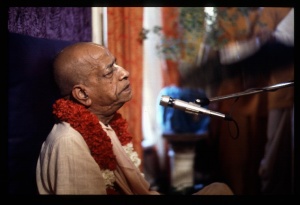SB 4.29.58: Difference between revisions
m (1 revision(s)) |
No edit summary |
||
| Line 1: | Line 1: | ||
{{info | {{info | ||
|speaker=King | |speaker=King Prācīnabarhiṣat | ||
|listener= | |listener=Nārada Muni | ||
}} | }} | ||
[[Category:Srimad-Bhagavatam - Canto 04 Chapter 29]] | |||
[[Category:Bhagavatam Verses Spoken by Pracinabarhisat Maharaja - Vanisource|042958]] | |||
<div style="float:left">'''[[Srimad-Bhagavatam]] - [[SB 4|Fourth Canto]] - [[SB 4.29: Talks Between Narada and King Pracinabarhi|Chapter 29: Talks Between Nārada and King Prācīnabarhi]]'''</div> | |||
<div style="float:right">[[File:Go-previous.png|link=SB 4.29.57]] '''[[SB 4.29.57]] - [[SB 4.29.59]]''' [[File:Go-next.png|link=SB 4.29.59]]</div> | |||
{{RandomImage}} | |||
==== TEXT 58 ==== | ==== TEXT 58 ==== | ||
<div | <div class="verse"> | ||
karmāṇy ārabhate yena | :karmāṇy ārabhate yena | ||
pumān iha vihāya tam | :pumān iha vihāya tam | ||
amutrānyena dehena | :amutrānyena dehena | ||
juṣṭāni sa yad aśnute | :juṣṭāni sa yad aśnute | ||
</div> | </div> | ||
| Line 16: | Line 22: | ||
==== SYNONYMS ==== | ==== SYNONYMS ==== | ||
<div | <div class="synonyms"> | ||
''karmāṇi''—fruitive activities; ''ārabhate''—begins to perform; ''yena''—by which; ''pumān''—a living entity; ''iha''—in this life; ''vihāya''—giving up; ''tam''—that; ''amutra''—in the next life; ''anyena''—another; ''dehena''—by a body; ''juṣṭāni''—the results; ''saḥ''—he; ''yat''—that; ''aśnute''—enjoys. | |||
</div> | </div> | ||
| Line 23: | Line 29: | ||
==== TRANSLATION ==== | ==== TRANSLATION ==== | ||
<div | <div class="translation"> | ||
The results of whatever a living entity does in this life are enjoyed in the next life. | The results of whatever a living entity does in this life are enjoyed in the next life. | ||
</div> | </div> | ||
| Line 30: | Line 36: | ||
==== PURPORT ==== | ==== PURPORT ==== | ||
<div | <div class="purport"> | ||
A person generally does not know how one body is linked with another body. How is it possible that one suffers or enjoys the results of activities in this body in yet another body in the next life. This is a question the King wants Nārada Muni to answer. How may one have a human body in this life and not have a human body in the next? Even great philosophers and scientists cannot account for the transferal of karma from one body to another. As we experience, every individual soul has an individual body, and one person's activities or one body's activities are not enjoyed or suffered by another body or another person. The question is how the activities of one body are suffered or enjoyed in the next. | A person generally does not know how one body is linked with another body. How is it possible that one suffers or enjoys the results of activities in this body in yet another body in the next life. This is a question the King wants Nārada Muni to answer. How may one have a human body in this life and not have a human body in the next? Even great philosophers and scientists cannot account for the transferal of ''karma'' from one body to another. As we experience, every individual soul has an individual body, and one person's activities or one body's activities are not enjoyed or suffered by another body or another person. The question is how the activities of one body are suffered or enjoyed in the next. | ||
</div> | </div> | ||
__NOTOC__ | |||
<div style="float:right; clear:both;">[[File:Go-previous.png|link=SB 4.29.57]] '''[[SB 4.29.57]] - [[SB 4.29.59]]''' [[File:Go-next.png|link=SB 4.29.59]]</div> | |||
__NOTOC__ | |||
__NOEDITSECTION__ | |||
Revision as of 17:11, 7 June 2021

A.C. Bhaktivedanta Swami Prabhupada
TEXT 58
- karmāṇy ārabhate yena
- pumān iha vihāya tam
- amutrānyena dehena
- juṣṭāni sa yad aśnute
SYNONYMS
karmāṇi—fruitive activities; ārabhate—begins to perform; yena—by which; pumān—a living entity; iha—in this life; vihāya—giving up; tam—that; amutra—in the next life; anyena—another; dehena—by a body; juṣṭāni—the results; saḥ—he; yat—that; aśnute—enjoys.
TRANSLATION
The results of whatever a living entity does in this life are enjoyed in the next life.
PURPORT
A person generally does not know how one body is linked with another body. How is it possible that one suffers or enjoys the results of activities in this body in yet another body in the next life. This is a question the King wants Nārada Muni to answer. How may one have a human body in this life and not have a human body in the next? Even great philosophers and scientists cannot account for the transferal of karma from one body to another. As we experience, every individual soul has an individual body, and one person's activities or one body's activities are not enjoyed or suffered by another body or another person. The question is how the activities of one body are suffered or enjoyed in the next.